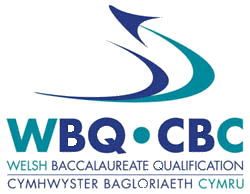Following a question from Macsen about the Welsh Baccalaureate in the comments on my previous post, I've looked into these results too, and they do have a very significant impact on the A Level figures for Wales.

The Welsh Baccalaureate Advanced Diploma normally includes A Levels (although it can include alternative equivalents like NVQ level 3) and those A Levels are included in the published JCQ figures. However the WBac itself (i.e. the WBac "Core") counts as the equivalent of an additional A Level at grade A (120 UCAS points), but is not included in the JCQ figures.
There were 4,360 WBac Advanced Diplomas awarded this summer, which is very healthy in comparison with the 2,564 who took maths A Level in Wales and 3,732 who took English. But of much more significance is the fact that the WBac pass rate was 81% ... so if it were to be counted as an A Level in the JCQ figures, it would push the Welsh grade figures up dramatically.
A total of 37,315 A Levels were taken in Wales this summer, with an A*-A pass rate of 25.0%. But if the WBac Core is added, the number taken rises by 5,383 to 42,698 and the A*-A pass rate rises to 9,329 + 4,360 = 13,689 = 32.1%
The combined A*-A pass rate for Wales, England and NI is 27.0% (Scotland takes different exams). For England alone the figure is 26.8% and for NI 35.7%. However Welsh A Levels and the WBac together can't be taken as an exact equivalent to other countries' A Levels, because of factors such as the International Baccalaureate. There are schools which offer the IB in all the countries of Britain, including Wales, even though most are in England. But the IB works as a completely different alternative, replacing rather than complementing A Levels, and that makes comparison difficult. It is offered by very few schools (fewer than 5%) and only taken up by a small handful in those schools. The number of diplomas awarded, even when counted as the equivalent of 4 A Levels, is less than 1% of the total number of A Levels passed. In contrast the WBac is taken by over 40% of those in year 13 in Wales.
-
So I now have to revise what I said before. It's not that our A Level students do slightly worse than England as a whole, but about equal to those regions of England with similar levels of prosperity. In terms of the sort of grades that get students into higher education, we in fact do quite a bit better than England, although it's difficult to put a precise figure on how much better. But we still spend much less money doing it.
Thanks Macsen. If you hadn't asked I wouldn't have looked for the figures. You've made my weekend ... and I hope yours!


2 comments:
I missed this article on Golwg 360, in which Brian Lightman of the ASCL said the same thing.
Google's translation is here.
I've just checked the International Baccalaureate site for info on the numbers of IB diplomas awarded in the UK. Data for 2010 is not available yet, but in May 2009 3,976 candidates were registered. There is no other information for the UK, so information has to be interpolated from the worldwide figures.
44,699 attempted the diploma out of a total of 96,776 registered, 46%. Therefore about 1,836 would have attempted the diploma in the UK. The pass rate was 78.7%. which would equate to 1,445 students in the UK being awarded a diploma. It's even harder to equate this to A levels, because an IB diploma equates to anything from 2 very good (or 3 average) A Levels to 6 A Levels. It is probably fair to say that the average equivalent is about 4 A Levels, or a total of 5,780.
The total number of A Levels sat in Wales, England and NI in summer 2010 was 853,933. So if the IB equivalent were to counted in the A Level figures it would only amount to 0.67% of the total, and even less if Scottish Highers were included. I've added that to the main post.
In other words, the IB is statistically insignificant in the UK figures. But the Welsh Bac is very significant in the Welsh figures, accounting for 12.6% of the A Level equivalents taken, and 10.7% of those passed.
Post a Comment